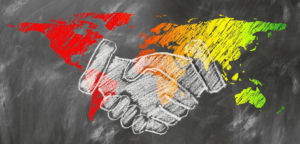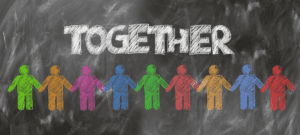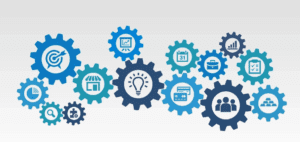In country specific contexts, UNICEF has highlighted the importance of assembling and aligning political groups and charitable organisations to tackle child poverty. This blog examines how establishing such an alliance might be achieved and considers which stakeholders would prove most suitable to help make UNICEF’s mission to end global child poverty a reality.
Identifying the right stakeholders
A top priority for individual nations is to identify the most influential people and pressure groups which can publicise the importance of child poverty and ultimately contribute and collaborate in practical ways to address it. Starting at the top of the political spectrum, it is vital to galvanise central governments to raise the profile of the issue and firmly embed it on the political agenda. Ideally a government department that has previously specialised in tackling poverty would become a central player of any new alliance. In theory, this would provide an official lobbying voice within a central government’s decision-making bodies. Subsequent access afforded to a financial ministry, or appropriate minister of state, or civil servants could help to enshrine action against poverty on the political agenda.
 The importance of data
The importance of data
It is easy to overlook the importance of accurate data in tackling child poverty. An independent office which researches and compiles statistics on a national scale is central to this. However, in some countries the compilation of useful, accurate data is a hugely challenging exercise. Political, financial, geographical and topographical factors can mean that data collection amounts to a general exercise in estimates. Without accurate figures central governments are unlikely to invest and commit more than token resources. Consequently, any alliance needs to be able to research and then present reliable data. It is a cornerstone in the fight against child poverty.
Other vital stakeholders
Non-political organisations are important independent bodies which can professionally contribute knowledge and expertise to help address child poverty. For example, the UNICEF backed Global Coalition to End Child Poverty is a collective group of dozens of organisations. They include religious bodies, international charities, child welfare bodies, trade unions and groups for social justice, a number of which are household names. Collectively these organisations can offer practical insights and policy advice, garnered from proven track records across the globe. Moreover, they collaborate by sharing resources, research, and data, as they formulate regional, national and international campaigns. These organisations can have a considerable impact on public opinion and generate support in a variety of ways. This can give a genuine sense of momentum and validity to any official campaign or policy addressing child poverty.
 A critical dual role
A critical dual role
UNICEF also highlights the importance of the dual way in which such groups address issues like child poverty. Naturally, civil society organisations propose, organise and direct fresh initiatives. For example, immediate help in the form of practical aid, medium term educational programmes, and long-term empowering of people to lift themselves out of poverty. However, their roles in advocacy and engaging in political debate both nationally and international are equally crucial in establishing and supporting national priorities. Essentially this action and support helps to highlight child poverty and keep it in the spotlight. It is by aligning themselves with the interests of central and local government, and with the diverse peoples of individual countries, that influential civil organisations can help to make breakthroughs in the battle against child poverty.
Research businesses and policy institutes
In depth and wide-ranging research which has been undertaken on a national scale can provide firm foundations for subsequent action. Research bodies specialise in thoroughly exploring societal issues which involve economic, cultural, military, technological or political factors and trends which have developed within a country. The fact that many organisations like these are autonomous is beneficial, although some do operate under the umbrella of central government or a political party. These businesses also specialise in advocacy and campaigning for change. They highlight the findings of their investigations among a range of communities as well as those policy makers who are considered the most influential political stakeholders. Again, if policy institutes can align the interests of policy makers with recommendations from their research, then it is far more likely that their role will be effective in galvanising change.
 Enshrining an ethical, holistic overview
Enshrining an ethical, holistic overview
Local and national research can also ensure that crucial, naturally arising and socially related issues are kept under review. For example, a campaign’s sustainability, carbon footprint, effective environmental, social and governance (ESG) metrics, general progress, strategic momentum, appeal and overall impact. Awareness of ESG has, for instance, revolutionised how investment decisions are taken. Monitoring and demonstrating how a campaign or organisation impacts on the society and communities in which it operates enshrines it with an important sense of ethical responsibility and authenticity. Political and business stakeholders are more inclined to embrace a new campaign if they can see that such issues are taken seriously by the core team.
A key role of engaging with children and their families
To ensure that issues surrounding child poverty at a local and national level are better understood, UNICEF advises that as a standard practice, young people and their families from a variety of cultural communities should be consulted throughout a campaign. To this end it is essential to reach out to people acknowledged to be living in poverty. Their input and responses will not only prove informative, but they should also offer genuine insight and evidence which can be used to inform strategic decision making.
The core team’s role
Initially constructing an experienced but small central team can ensure an appropriate focus on the challenge of addressing child poverty. This team needs to maintain an overarching role, give direction, promote advertising, empower action through research, and responsibly monitor the campaign’s progress, impact and direction. 
Potential allies for the core team
Natural allies include journalists, branches of the media, politicians, charities, religious groups, human rights organisations, pressure and research groups. These will all have opportunities to contribute to an evolving consensus, strategy and subsequent action as a campaign evolves. However, the core team will be aware of potential allies and these form an intriguingly unaligned group whose possible involvement may make a huge difference to a campaign’s outcome. These will include organisations and individuals who do not work directly with young people, or in the sphere of tackling poverty. For example, non-government organisations (NGOs) like a charity which specialises in health and wellbeing, or education, or sanitation, or crime prevention, or advocacy for minority rights. These organisations may well not work directly with children, or children who live in poverty, although the focus of their missions may inevitably overlap with child poverty. Nonetheless a core team should aim to embrace groups like these because their involvement can ultimately prove to be mutually beneficial.
International day for the eradication of child poverty
On 17th October 2023, people from across the globe participated in a variety of events to continue to highlight the ongoing need for co-ordinated action to bring about the eradication of child poverty. The United Nations, based in New York, staged a poignant conference and commemoration which presented an unequivocal message through artistic performances, music, and speeches. Many stakeholders participated, including people who live in poverty, children, state ambassadors, political and business leaders, activists, and charities. The message to the world was simple enough: it remains morally imperative to ‘stand in solidarity with people who are facing struggle and exclusion every day’. It is by constructing appropriate alliances which can responsibly and effectively tackle child poverty on a nation by nation basis that the aims of UNICEF and the Global Coalition can be made reality.



